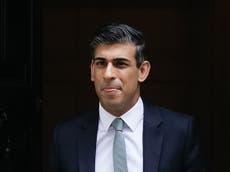There’s only one Tory leadership candidate Labour should fear – and it’s not Rishi Sunak
Just as it did in 2001, the Conservative Party faces a choice between right-wing ideology and electability

More than 20 years ago, the Labour Party let it be believed during the Conservative leadership contest of 2001 that Michael Portillo was the candidate they most feared.
It was a trick. In fact, as Derek Draper, the former adviser to Peter Mandelson, eventually revealed in the Daily Mail, Kenneth Clarke was seen as the real threat to the then New Labour government.
Today, some might think that Rishi Sunak, another slick frontrunner – who, like “Plotillo” as he was known in Clarke circles, claims the support of up to 100 MPs – frightens the opposition. They would be wrong again.
In fact, there is now only one candidate to succeed Boris Johnson who should really concern Labour: Johnson’s nemesis, Tom Tugendhat.
The moderate MP for Tonbridge and Malling has only been a Conservative member since being selected in 2015, and, as well as a record of opposing Johnson, has a hinterland that goes well beyond Tory party politics and Westminster hackery.
He served with the Royal Marines in Iraq during the 2003 invasion, and was mobilised as an Arabic-speaking intelligence officer. Tugendhat, who has also been the military assistant to the chief of defence staff, served in Afghanistan for two years and finished his final patrol there in 2009. He would go on to describe the fall of Kabul under Johnson’s watch as Britain’s “biggest foreign policy disaster since Suez”.
A practising Catholic who is close friends with Jacob Rees-Mogg – despite the two men disagreeing over Johnson – Tugendhat, who has a French wife and two children, is seen as a man of straightforward integrity in a party thirsty for a return to normal levels of decency in government.
He has already been attacked by The Spectator as untested and too pro-European, having voted Remain, and by the “anti-woke” website Spiked, which declared “Anyone but Tom Tugendhat”.
But among serious Labour advisers who follow their opponents, the fear is that, should he reach the final two, the thirst for integrity may even prevail among the peculiar electorate that is the Tory party membership.
A former senior Labour strategist who follows Tory politics closely says: “Tugendhat, as the ‘clean start’ candidate, is the most problematic for Labour. He has impressed MPs across the aisle in the Commons.” A Starmer adviser admitted: “It would be bad for us if the Tories chose someone from the next generation.”
To keep up to speed with all the latest opinions and comment, sign up to our free weekly Voices Dispatches newsletter by clicking here
Although, unlike Sunak, he failed to produce a slick campaign video for a website registered months ago, Tugendhat has had a near-perfect launch. Ladbrokes had him at 20-1 on Thursday, but on Friday he declared his candidacy in The Daily Telegraph with the headline: “I have served before. Now I hope to answer the call as prime minister.”
By Saturday, when Tugendhat had made a positive and crucial case for retaining the union with Scotland in The Times, his odds had been slashed to 8-1. The decision on the same day by Ben Wallace, the defence secretary, not to run only boosted his campaign.
As they did in 2001, the Tories face a choice: right-wing ideology or electability. Ken Clarke was a winner with the country, whom the party rejected. Labour will be hoping they make the same mistake again.
James Macintyre is co-author of ‘Ed: The Milibands and the Making of a Labour Leader’



Join our commenting forum
Join thought-provoking conversations, follow other Independent readers and see their replies
Comments